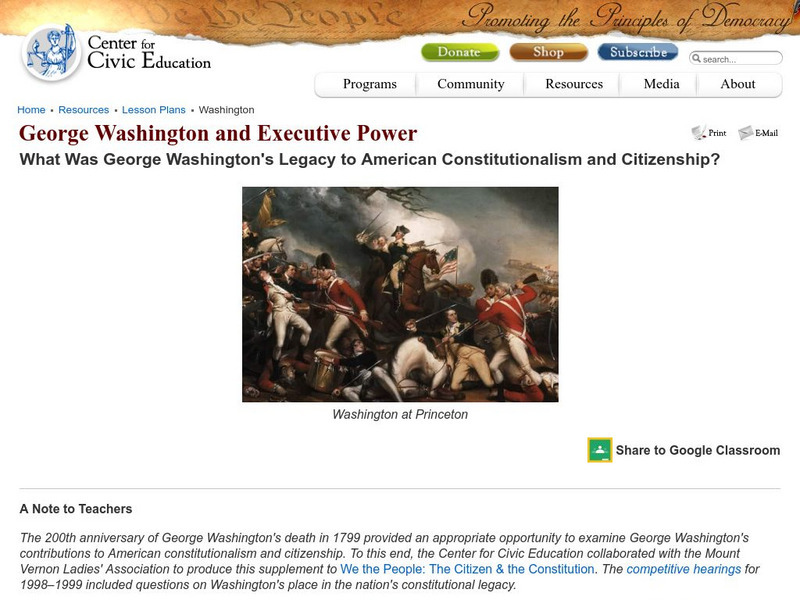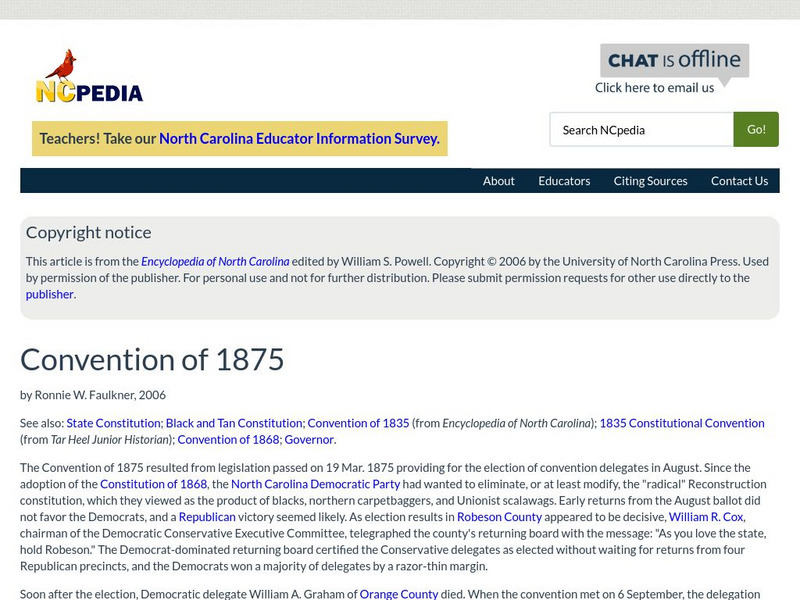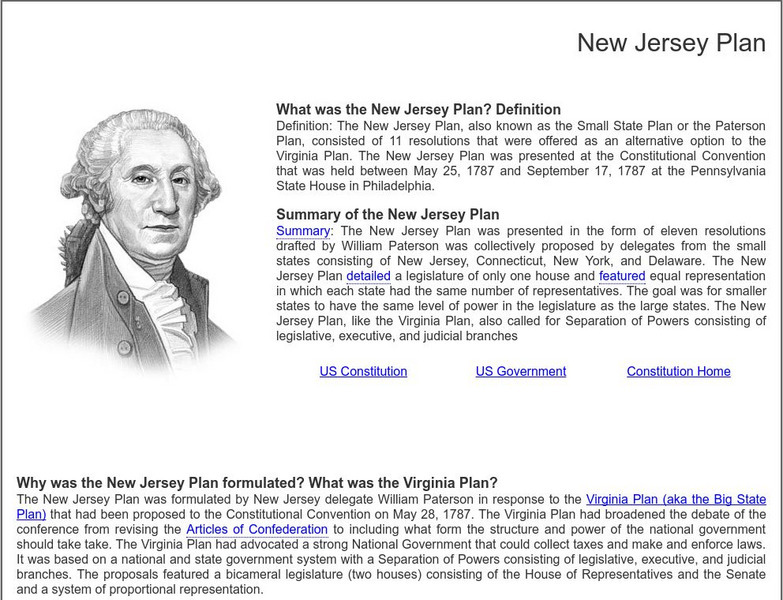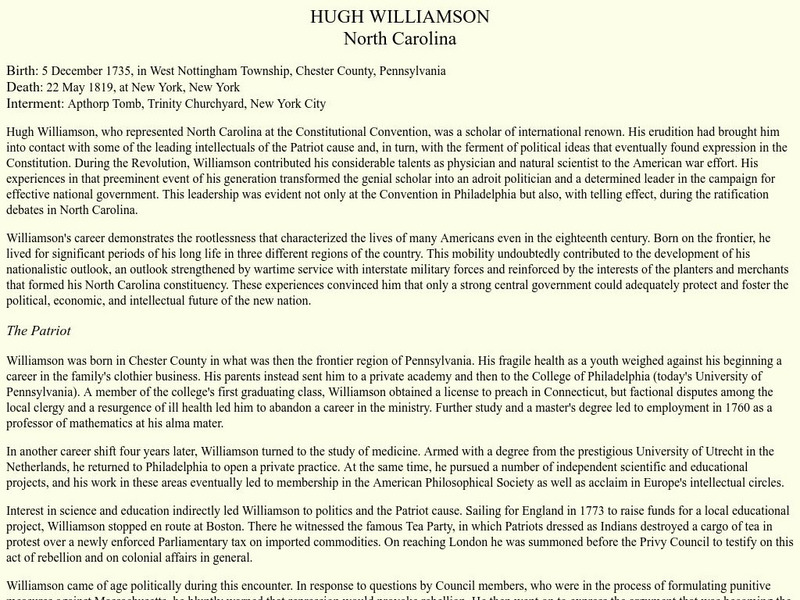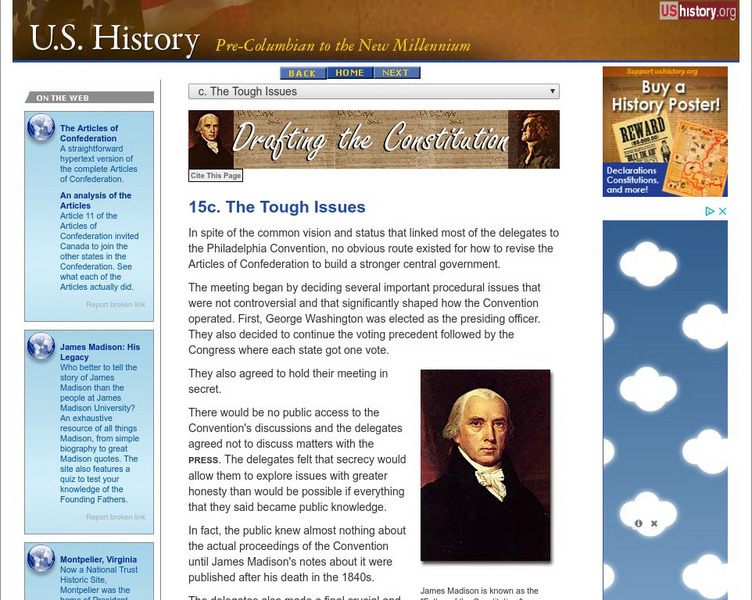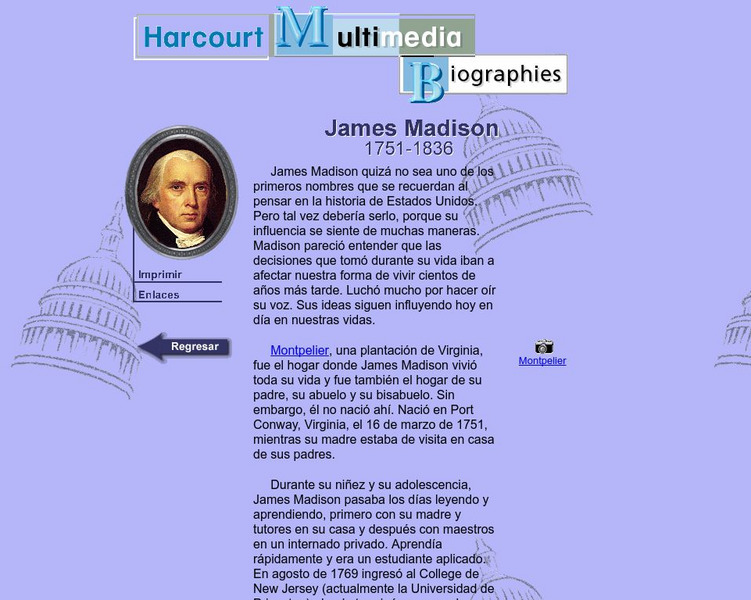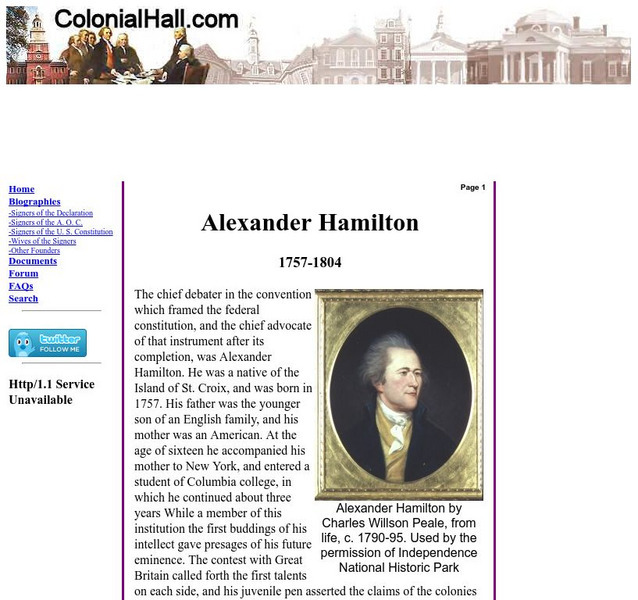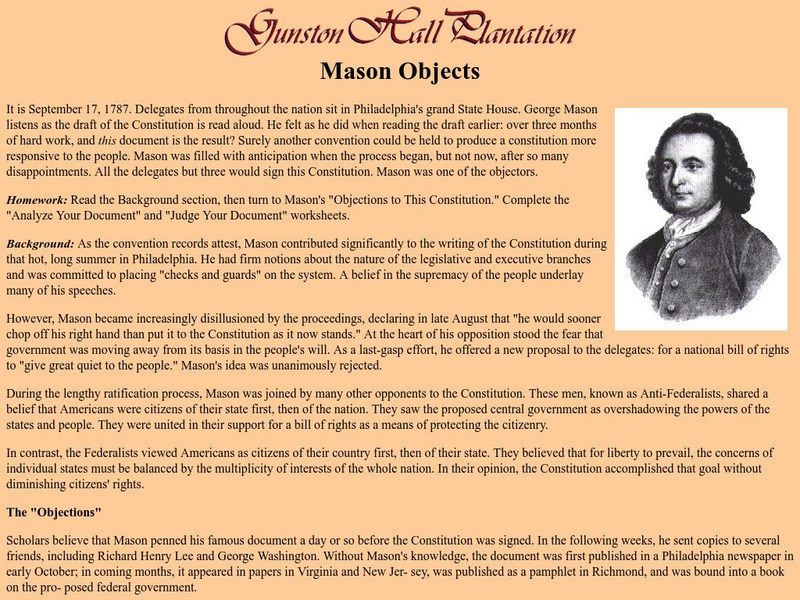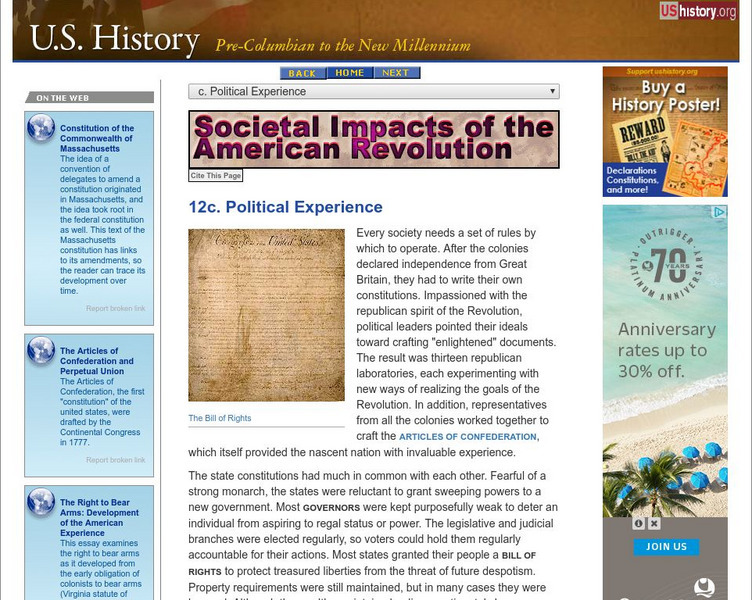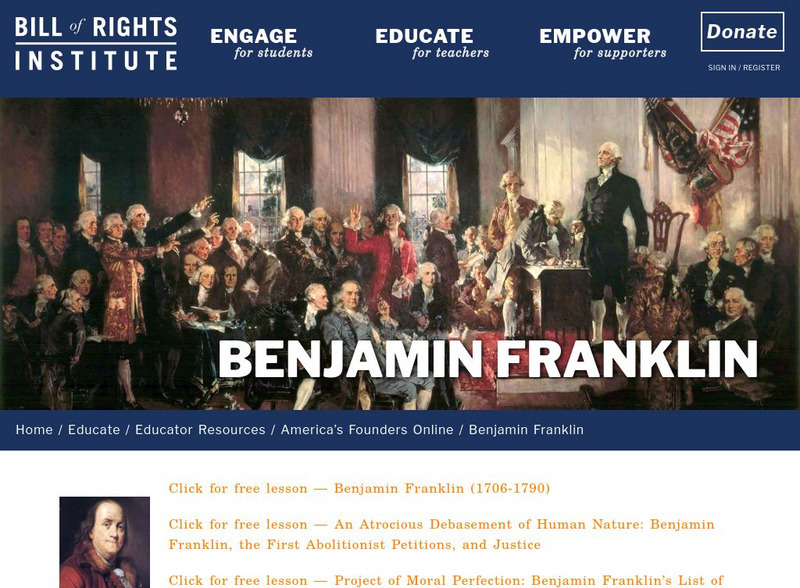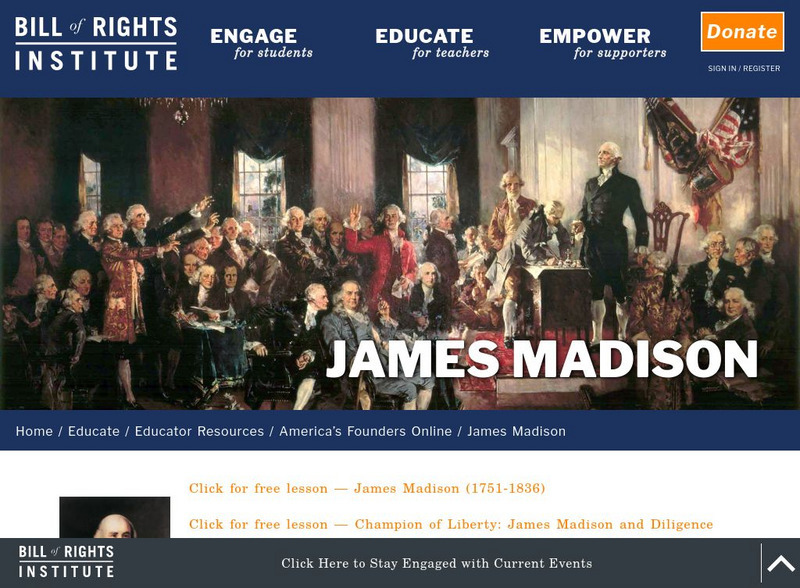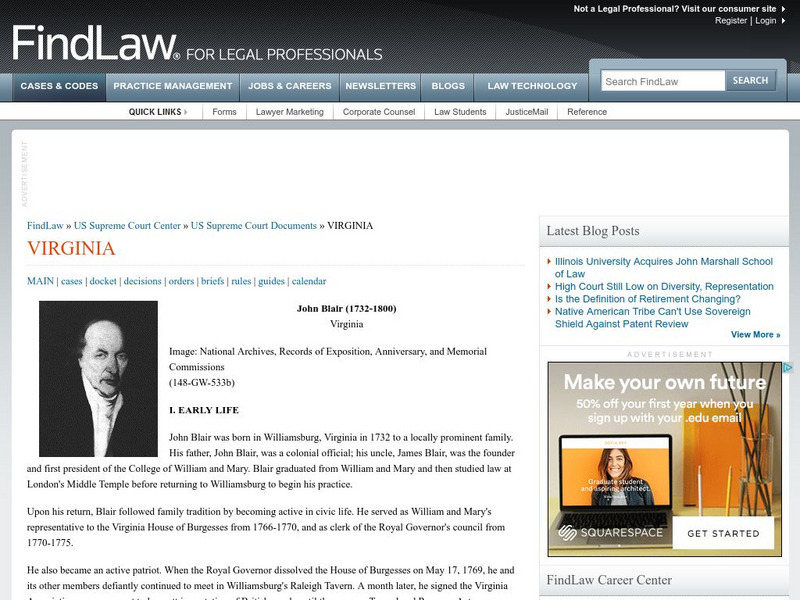ibiblio
Ibiblio: Burma Myanmar: How to Read the Generals' "Roadmap"
A thoughtful explanation of the "roadmap" laid out by the head of the military junta as a guide for a national constitutional convention. Many primary source links included.
Center For Civic Education
Center for Civic Education: George Washington and Executive Power
George Washington had a role in establishing our nation from the Revolutionary War through his presidency. He was a commander, a delegate to the Constitutional Convention, and a reluctant first President. Analyze his political...
State Library of North Carolina
N Cpedia: Convention of 1875
The Convention of 1875 resulted from legislation passed on 19 Mar. 1875 providing for the election of convention delegates in August. Since the adoption of the Constitution of 1868, the North Carolina Democratic Party had wanted to...
Siteseen
Siteseen: Government and Constitution: New Jersey Plan
New Jersey Plan was presented in the form of eleven resolutions drafted by William Paterson. It detailed a legislature of only one house and featured equal representation in which each state had the same number of representatives thus...
Siteseen
Siteseen: Government and Constitution: Virginia Plan
Learn about the Virginia Plan that was based on a national and state government system with a separation of powers consisting of legislative, executive, and judicial branches. It also contained a resolution for proportional...
Digital History
Digital History: The Delegates
An interesting look at the background of the men who gathered in Philadelphia to frame a new constitution for the new country.
University of Pennsylvania
University of Pennsylvania Archives & Records: Thomas Fitzsimons
A brief biography of this signer of the Constitution. He later served as a trustee of the University of Pennsylvania.
US Army Center
U.s. Army Center of Military History: Rufus King
A good biographical sketch of Rufus King, one of the signers of the Constitution. He was a delegate from Massachusetts. He served in the Revolutionary war and was later a senator from New York.
US Army Center
U.s. Army Center of Military History: Hugh Williamson, North Carolina
A nice biography of Hugh Williamson, a signer of the Constitution from North Carolina. It discusses his career as doctor, soldier and politician.
Library of Congress
Loc: The New Nation, 1783 1815
The links in the New Nation, which is provided for by the Library of Congress, will lead you to sets of selected primary sources on a variety of topics,such as the Constitution, governmental policy on Native Americans, and problems and...
Independence Hall Association
U.s. History: The Tough Issues
Read about the change of plans when delegates to the Philadelphia convention decided to write a new constitution to replace the Articles of Convention. See the ideas delegates had to address concerns of large and small states.
Houghton Mifflin Harcourt
Harcourt: Biographies: James Madison
A brief biography of James Madison. Find out why James Madison was called the father of the constitution. Learn how his life affected the United States. (In Spanish)
University of Groningen
American History: Biographies: Alexander Hamilton
This site is provided for by the University of Groningen. Alexander Hamilton represented the growing movement towards a strong national government. Read the beginning stages of the nationalist movement, the conflicting ideas of state...
University of Groningen
American History: Outlines: Checks and Balances
Overview of the principle of checks and balances proposed in the Federalist Papers.
Other
Colonial Hall: Biography of Alexander Hamilton
Detailed biographical information on one of our founding fathers, Alexander Hamilton. He was a signer of the Constitution, a General, and a co-author of The Federalist Papers.
Other
Gunston Hall Plantation: Mason Objects
In this set of activities, young scholars learn what George Mason's objections were to the U.S. Constitution. They then evaluate them through a class discussion and divide into groups to hold a debate about the disagreement between the...
Independence Hall Association
U.s. History: Political Experience
Read about how the state governments in the new American nation served as the laboratory to try out new ideas of governing and treating citizens. See how remarkably similar the ideas put forth in state constitutions were to each other.
Bill of Rights Institute
Bill of Rights Institute: Benjamin Franklin
Although he was the old sage of the American Revolution and the Founding generation, Benjamin Franklin's considerable work in the areas of journalism, science, and invention often obscure his many contributions to the creation of the...
Bill of Rights Institute
Bill of Rights Institute: James Madison
James Madison's slight stature and reserved personality gave little indication of his keen intellect and shrewd nature. No other Founder had as much influence in crafting, ratifying, and interpreting the United States Constitution and...
Thomson Reuters
Find Law: Founding Fathers: Edmund Randolph
The major focus of this site is Randolph's role in the creation of the Constitution and his views on the structure of the executive branch of government.
University of Groningen
American History: Biographies: Pierce Butler 1744 1822
One of the most aristocratic delegates at the convention, Butler was born in 1744 in County Carlow, Ireland. His father was Sir Richard Butler, member of Parliament and a baronet.
University of Groningen
American History: Biographies: George Wythe 1726 1806
Biography of George Wythe, 1726-1806, a learned man and teacher who supported the American Revolution and was a delegate to the Continental Congress, signing the Declaration of Independence and attended the Constiutional Convention.
Bill of Rights Institute
Bill of Rights Institute: Charles Pinckney
Born near Charles Town (now Charleston), South Carolina, Charles Pinckney was the child of a wealthy family. He received a first-rate education and became an accomplished lawyer. Pinckney joined the state militia during the American...
Digital History
Digital History: The Road to Philadelphia [Pdf]
The new United States government had many problems under the Articles of Confederation. Find out what these problems were, but also discover some of the successes accomplished under that constitution. [pdf]



